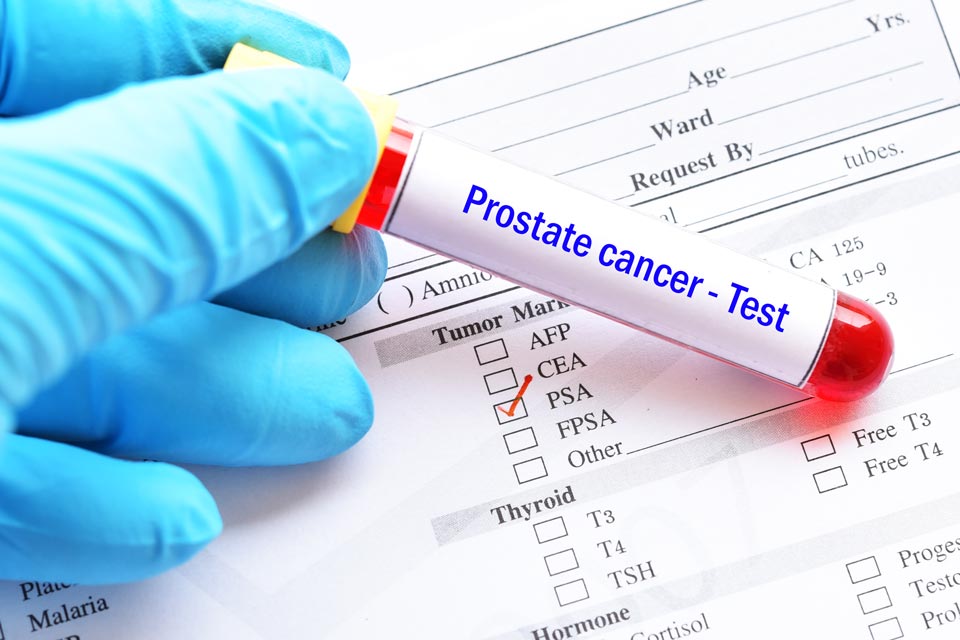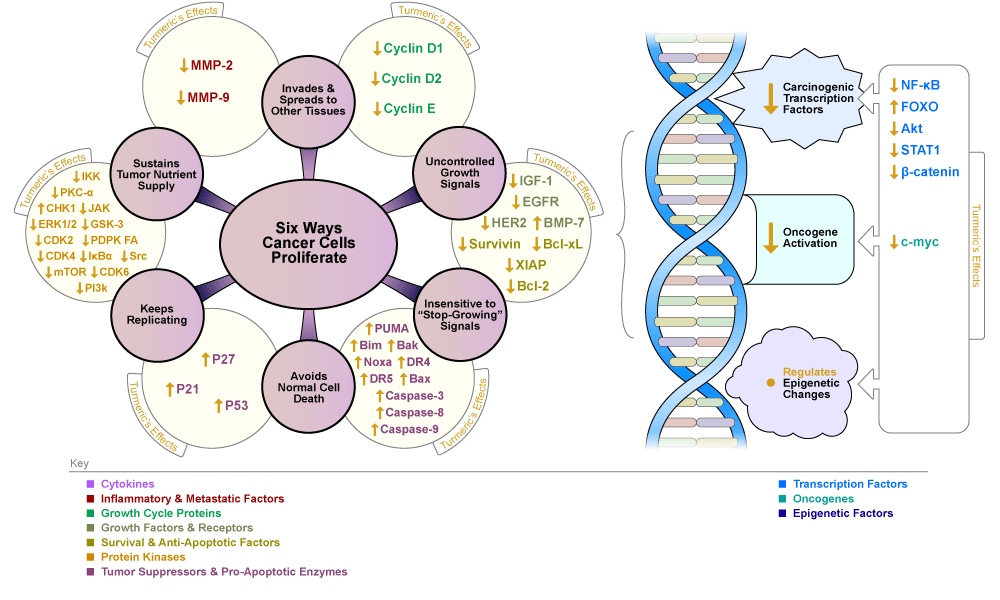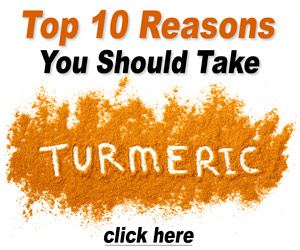Fight Prostate Cancer with Turmeric

Can a spice help prevent or treat cancer? Some researchers say that if you consider the role of chronic inflammation in cancer, than the powerful anti-inflammatory compounds in spices such as turmeric are certainly beneficial. (vi.403)
Prostate cancer is one of the most frequently diagnosed cancers in the United States, and the 2nd leading cause of cancer-related death. In comparison, India has very low rates of prostate cancer. Some researchers suggest that their diet, high in spices and foods such as turmeric, black cumin, lycopene-rich vegetables, and whole grains may have something do with their low prostate cancer rates. (vi.403-405)
Conventional treatment can involve surgery, radiation, and chemotherapy. However, since inflammation and androgen hormones are involved in prostate cancer, research suggests that combining these therapies with drugs that target inflammation and hormone receptors may make them more effective. (vi.403, 404)
BPA & Prostate Cancer
Bisphenol A (BPA) is a compound found in many plastic containers, toys, water pipes, and food package linings. BPA causes harmful epigenetic changes to DNA. Animal studies show that BPA exposure in the uterus and after birth increases the risk of metabolic disorders and hormone-related cancers, including prostate cancer. Turmeric compounds (such as curcumin and quercetin) may help suppress BPA epigenetic changes that promote cancer. (vi.481, 482)
How Can Turmeric Help?
One of the most common measurements for prostate health is prostate-specific antigen (PSA), a factor involved in inflammation. PSA levels also correspond to androgen hormone levels. Studies show that turmeric and its compounds can help lower elevated PSA and androgen receptor levels. (vi.403, 404)
Turmeric and its compounds may also help control blood sugar and obesity. This is important because: (vi.213)
- Chronic high blood sugar may increase the risk of prostate cancer. (vi.250, 406)
- High blood sugar can lead to abnormal insulin levels, and some of the growth factors found in hyperinsulinemia are linked to increased risk of prostate cancer. Studies show that of turmeric compounds can help regulate these growth factors. (vi.103, 250)
- Obesity is linked to a greater risk of developing or dying from advanced prostate cancer. (vi.407)
Lab and animal studies suggest the benefits of some turmeric compounds against prostate cancer include:
| Turmeric Compound | Effects |
|---|---|
|
Question: How can alpha-linolenic acid help fight prostate cancer? Answer: Alpha-linolenic acid can help normalize insulin-like growth factors (i.e., IGF-1) linked to hyperinsulinemia and prostate cancer risk. (vi.406, 408) |
|
|
Curcumin and curcumin analogs (vi.71) |
Question: Can curcumin and curcumin analogs help fight prostate cancer? Answer: Research shows curcumin and its analogs exhibit a range of activity that could help keep the prostate healthy and fight prostate cancer. These efffects include:
|
|
Elemene (vi.415) |
Question: How can elemene help fight prostate cancer? Answer: Cancer-fighting effects of elemene include: |
|
Question: Can eugenol help fight prostate cancer? Answer: Studies show eugenol inhibits the growth of prostate cancer cells. (vi.77) |
|
|
Question: How can fisetin help fight prostate cancer? Answer: Studies indicate fisetin has a number of effects that could help fight prostate cancer, including:
|
|
|
Question: Can folate help fight prostate cancer? Answer: Although in some instances high folate levels are associated with increased risk of prostate cancer, folate supplements are not linked to prostate tumor growth or progression. In fact, some studies suggest folate may be protective against prostate cancer. (vi.411) |
|
|
Question: Can geraniol help fight prostate cancer? Answer: Research shows geraniol has a number of effects that could help fight prostate cancer, including:
|
|
|
Question: Can germacrone help fight prostate cancer? Answer: Germacrone suppresses cancer-promoting androgen hormone activity. (vi.415) |
|
|
Question: How can limonene help fight prostate cancer? Answer: Limonene promotes death of prostate cancer cells no longer responsive to hormone therapy. (vi.417) |
|
|
Question: Can linoleic acid help fight prostate cancer? Answer: Research suggests linoleic acid can reduce the risk of prostate cancer, including low grade cancer (according to the large clinical SELECT trial). (vi.418) |
|
|
Question: How can myricetin help fight prostate cancer? Answer: In lab studies, myricetin triggered cancer cell cycle arrest and death in various prostate cancer lines. (vi.194) |
|
|
Question: How do phytosterol compounds help fight prostate cancer? Answer: Studies suggest both phytosterols in turmeric, beta-sitosterol and stigmasterol, can help block prostate cancer growth by regulating tumor suppressors. (vi.419) |
|
|
Question: Is quercetin good for prostate cancer? Answer: Quercetin suppresses kinase and metalloprotease enzymes that promote cancer spread in certain prostate cancer lines. (vi.78, 227) Eating onions frequently, which are particularly rich in quercetin, has also been associated with a lower risk of prostate cancer. (vi.250) |
|
|
Question: How can resveratrol help fight prostate cancer? Answer: Resveratrol has a number of effects that could help fight prostate cancer, including:
Resveratrol also helps regulate transcription factors that enhance effectiveness of TRAIL therapy in inhibiting prostate tumor growth. (vi.421) |
|
|
Question: How can vitamin C help fight prostate cancer? Answer: Studies indicate vitamin C has a number of effects that could help fight prostate cancer. These include:
However, in a large clinical trial, 500 mg/day vitamin C supplements do not appear to lower the risk of prostate cancer. (vi.423) |
|
|
Question: Is vitamin E good for stopping prostate cancer? Answer: Vitamin E supppresses prostate cancer growth, alone and in combination with Vitamin C. (vi.423) In a large clinical trial, vitamin E supplements reduced risk of prostate cancer and mortality in those that had it. However, experts caution to not exceed 400 IU/day, since high doses have been linked to risk of heart failure and death. (vi.423) |
|
|
Whole Ground Turmeric |
Question: Is ground turmeric good for stopping prostate cancer? Answer: Whole turmeric helped lower PSA levels, when combined in a supplement with pomegranate, green tea, and broccoli. (vi.424) |

How Turmeric Compounds Stop Prostate Tumor Cells (vi.35, 36, 78, 81, 103, 126, 127, 194, 227, 250, 324, 406, 408-424)
Clinical Evidence Turmeric and Curcumin Help Fight Prostate Cancer

| Study Type | Treatment & Study Length |
|---|---|
|
Double-Blinded, Randomized, Placebo-Controlled Clinical Trial |
Curcumin and soy isoflavone supplement, once a day for 6 months. (vi.412) |
|
Results |
|
|
The patients all had higher than normal PSA levels (of at least 10 µg/ml) and had undergone prostate biopsy before the beginning of the study. None of the trial participants had prostate cancer, but elevated PSA is a sign of chronic inflammation that increases the risk of cancer. (vi.412) Compared to the placebo group and pre-trial testing, the curcumin-soy supplements significantly reduced PSA levels. They also suppressed the expression of androgen hormone receptors. (vi.412) |
|
| Study Type | Treatment & Study Length |
|
Double-Blind, Placebo-controlled Randomized Clinical Trial 199 patients with localized prostate cancer, ages 53-89 (134 in treatment group, 65 in placebo group). (vi.424) |
Turmeric, pomegranate, broccoli, and green tea supplements, ground and in tablet form, or placebo, 3 times per day for 6 months. (vi.424) |
|
Results |
|
|
PSA levels in the trial participants were tested at the beginning of the study, at 2 months, and at 6 months. On average, the PSA in those who took the turmeric-containing supplement dropped by 0.14%. In comparison, the average PSA for those on the placebo increased by almost 47%. (vi.424) |
|
| Study Type | Treatment & Study Length |
|
Randomized, Placebo-Controlled, Pilot Clinical Trial 40 patients with prostate cancer; 20 in the curcumin treatment group and 20 in the control group. (vi.425) |
Curcumin - 3 g/day oral supplements in the treatment group (1000 mg with each meal) during 8 weeks of radiation treatment and for 12 weeks post-radiation. (vi.425) |
|
Results |
|
|
One of the side effects of radiotherapy are urinary symptoms that can include: (vi.425)
A greater number from curcumin group reported having to hurry more to get to the toilet, and more painful urination. However, overall the patients who took curcumin had significantly less urinary problems than those who took placebo. (vi.425) Other side effects include bowel and sexual dysfunction. Although there appeared to be some benefit in terms of sexual function, this dose of curcumin did not significantly improve these symptoms. (vi.425) |
|
Join the 1000s of People Who Are Discovering the Benefits of Turmeric.

Healthceuticals® Turmeric Curcumin Complex
100% Certified
Organic ingredients
- Organic Turmeric Extract - standardized to 95% curcuminoids.
- Organic Whole Turmeric - provides full spectrum antioxidant, anti-inflammatory turmeric benefits, including turmerones and numerous vitamins, minerals, and phytonutrients
- Organic Black Pepper Extract - standardized to 95% piperine; dramatically enhances bioavailablity.
- Organic Phospholipids - markedly improve absorption.
- Organic Ginger - works synergistically with turmeric to provide more powerful benefits.
- Absolutely FREE of potentially harmful additives and fillers such as magnesium stearate.



